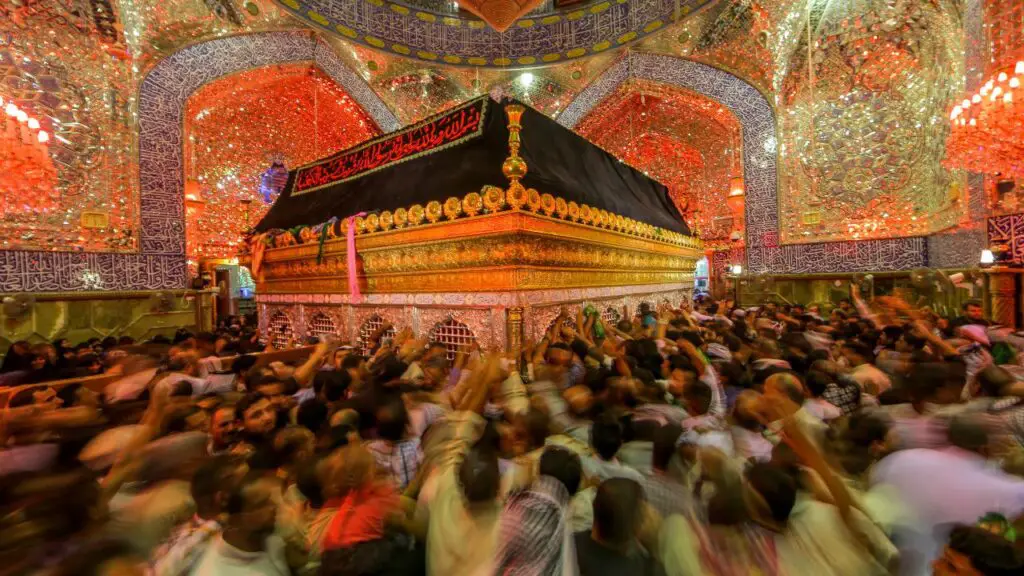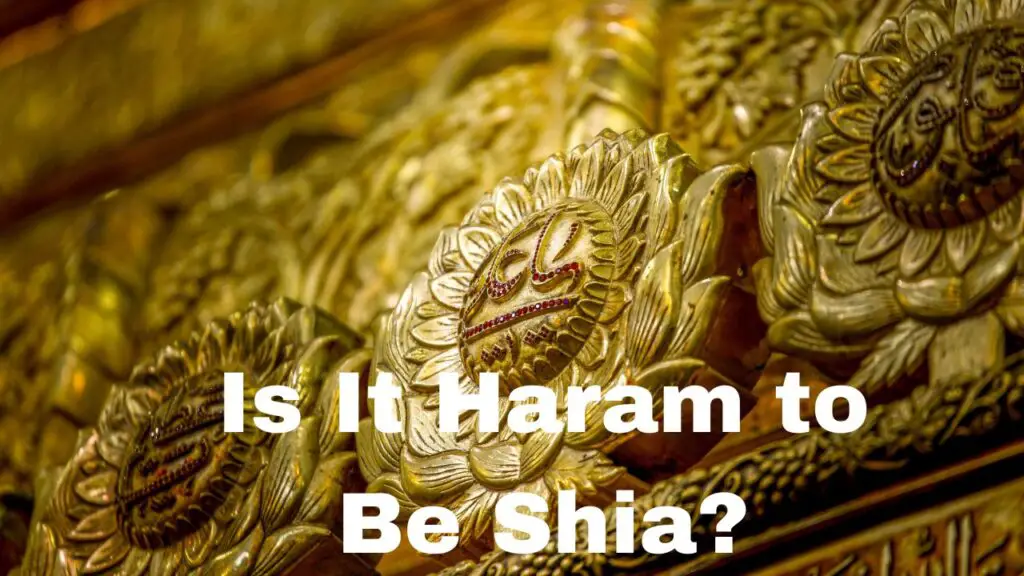Is It Haram to Be Shia? |Exploring Unity in Islam|2023
Exploring Misconceptions and Unity in Islam

Is It Haram to Be Shia?
No, Shia is not inherently haram. Both Sunni and Shia Muslims share the fundamental beliefs of Islam, despite historical differences in interpretation and practice.

The Story of Zam Zam Water : A Source of Significance
Intoduction
In the diverse landscape of Islamic beliefs and practices, the division between Sunni and Shia Muslims has been a source of both unity and conflict. Unfortunately, misunderstandings and misinformation have perpetuated misconceptions about the Shia branch of Islam, raising questions such as: Is it haram (forbidden) to be Shia? This article aims to address this question and shed light on the misconceptions surrounding Shia Islam, emphasizing the importance of understanding and tolerance within the Islamic community.
Historical Context
The split between Sunni and Shia Muslims traces back to the early days of Islam, following the death of the Prophet Muhammad. While both groups share the fundamental tenets of the faith, differences in leadership and interpretations of certain historical events led to a division. Shia Muslims believe that leadership should have been passed down through the Prophet’s family, while Sunni Muslims emphasize community consensus in choosing leaders. This initial ideological difference laid the groundwork for subsequent misunderstandings.

Misconception: Shia Islam as Haram
The term “haram” refers to actions or beliefs that are considered sinful or forbidden in Islam. It is crucial to clarify that the notion of being Shia is not inherently haram. Shia Muslims, like Sunni Muslims, adhere to the core principles of Islam, including the belief in one God (Allah), the Prophet Muhammad as the final messenger, and the teachings of the Quran. The differences between the two groups are primarily related to historical interpretations and practices rather than the foundational aspects of the faith.
Misconceptions about Shia Islam being haram often stem from the spread of biased information, sectarian tensions, and a lack of dialogue between the two communities. Just as within Sunni Islam, there is a spectrum of beliefs and practices among Shia Muslims, which further emphasizes the need to avoid blanket judgments.
Tolerance and Understanding
Islam places great importance on unity and understanding within the ummah (Islamic community). The Quran emphasizes that believers should hold onto the rope of Allah together and avoid division. The Prophet Muhammad himself highlighted the value of unity and brotherhood among Muslims, regardless of their differences. Therefore, labeling an entire branch of Islam as haram solely based on theological differences contradicts the spirit of tolerance and unity that Islam promotes.
It is crucial for Muslims to engage in open and respectful conversations that foster understanding among different sects. Misconceptions can be dispelled through education, interfaith dialogue, and interactions that focus on common ground rather than differences. Such efforts are instrumental in overcoming biases and building bridges within the diverse Islamic community.

Is It Haram to Be Shia?
No, Shia is not inherently haram. Both Sunni and Shia Muslims share the fundamental beliefs of Islam, despite historical differences in interpretation and practice.
What are the main differences between Sunni and Shia Muslims?
The primary difference lies in their understanding of leadership and succession after Prophet Muhammad’s death. Sunnis believe in community consensus, while Shia Muslims believe in leadership within the Prophet’s family.
Do Sunni scholars label Shia Islam as haram?
While some Sunni scholars may have disagreements with certain Shia practices, it is not a unanimous view. Labeling Shia Islam as haram contradicts the principles of unity and respect in Islam.
Is sectarianism permissible in Islam?
No, Islam strongly discourages sectarianism and emphasizes unity among Muslims. Sectarianism can lead to division within the ummah, which goes against the teachings of the Quran and the Prophet Muhammad.
Are there different branches within Shia Islam?
Yes, there are several branches within Shia Islam, each with distinct beliefs and practices. Some of the prominent branches include Twelvers, Ismailis, and Zaidis.
Challenging Sectarianism
Sectarianism, the rigid belief in the superiority of one’s own sect over others, is a challenge that has plagued the Muslim world for centuries. This mindset has contributed to misunderstandings and conflicts within the ummah. Muslims are encouraged to transcend sectarian boundaries and embrace the diversity of thought and practice within Islam.
Condemning an entire group, whether Sunni or Shia, as haram only fuels sectarianism and further divides the community. Instead, scholars and leaders should promote the understanding that differences in interpretations and practices are natural within any religious tradition and that respectful dialogue is a means of fostering unity.

Conclusion
In conclusion, it is not accurate or fair to label Shia Islam as haram. Such a stance contradicts the principles of understanding, unity, and tolerance that are integral to Islam. Just as within any religious tradition, differences exist among Shia Muslims due to historical, cultural, and theological factors. To truly understand and appreciate these differences, it is crucial to engage in respectful conversations, seek knowledge from authentic sources, and embrace the principles that unite Muslims rather than focusing on the aspects that divide them. By fostering an environment of open-mindedness and respect, we can overcome misconceptions and work towards a more unified and harmonious ummah.

Faqs
Are there instances of Shia-Sunni cooperation throughout history?
Yes, history has shown instances of cooperation and unity between Shia and Sunni communities. Muslims have come together for common causes and respected each other’s practices.
Do Shia and Sunni Muslims worship differently?
While there are some differences in rituals and practices between Shia and Sunni Muslims, both groups worship the same God and follow the teachings of the Quran.
Can Sunni and Shia Muslims marry each other?
Yes, Sunni and Shia Muslims can marry each other. Inter-sect marriages are allowed in Islam, as long as both partners adhere to the fundamental principles of the faith.
Is it haram to learn about Shia Islam?
No, it is not haram to learn about Shia Islam or any other sect within Islam. Knowledge-seeking and understanding different perspectives are encouraged in the religion.
How can misconceptions about Shia Islam be addressed?
Misconceptions can be addressed through education, open dialogue, and respectful interactions. Engaging with reliable sources and scholars from both sects is crucial.
Are there theological similarities between Sunni and Shia Islam?
Yes, there are numerous theological similarities between the two groups, including belief in the same God, the Quran, and the prophethood of Muhammad.
Are there historical reasons for the divide between Sunni and Shia Muslims?
Yes, historical events such as the death of Prophet Muhammad and disputes over leadership contributed to the division. However, this divide does not make either group inherently haram.
Is it possible for a Sunni to convert to Shia Islam or vice versa?
Yes, individuals are free to choose their religious affiliation based on their understanding and beliefs. Conversion between Sunni and Shia Islam is possible.
How can Muslims promote unity between Sunni and Shia communities?
Muslims can promote unity by focusing on common beliefs, engaging in respectful discussions, and avoiding stereotypes or derogatory language.
Do Sunni-majority countries persecute Shia Muslims?
While instances of discrimination have occurred in some regions, it’s important not to generalize. Not all Sunni-majority countries persecute Shia Muslims, and such actions go against the principles of Islam.





